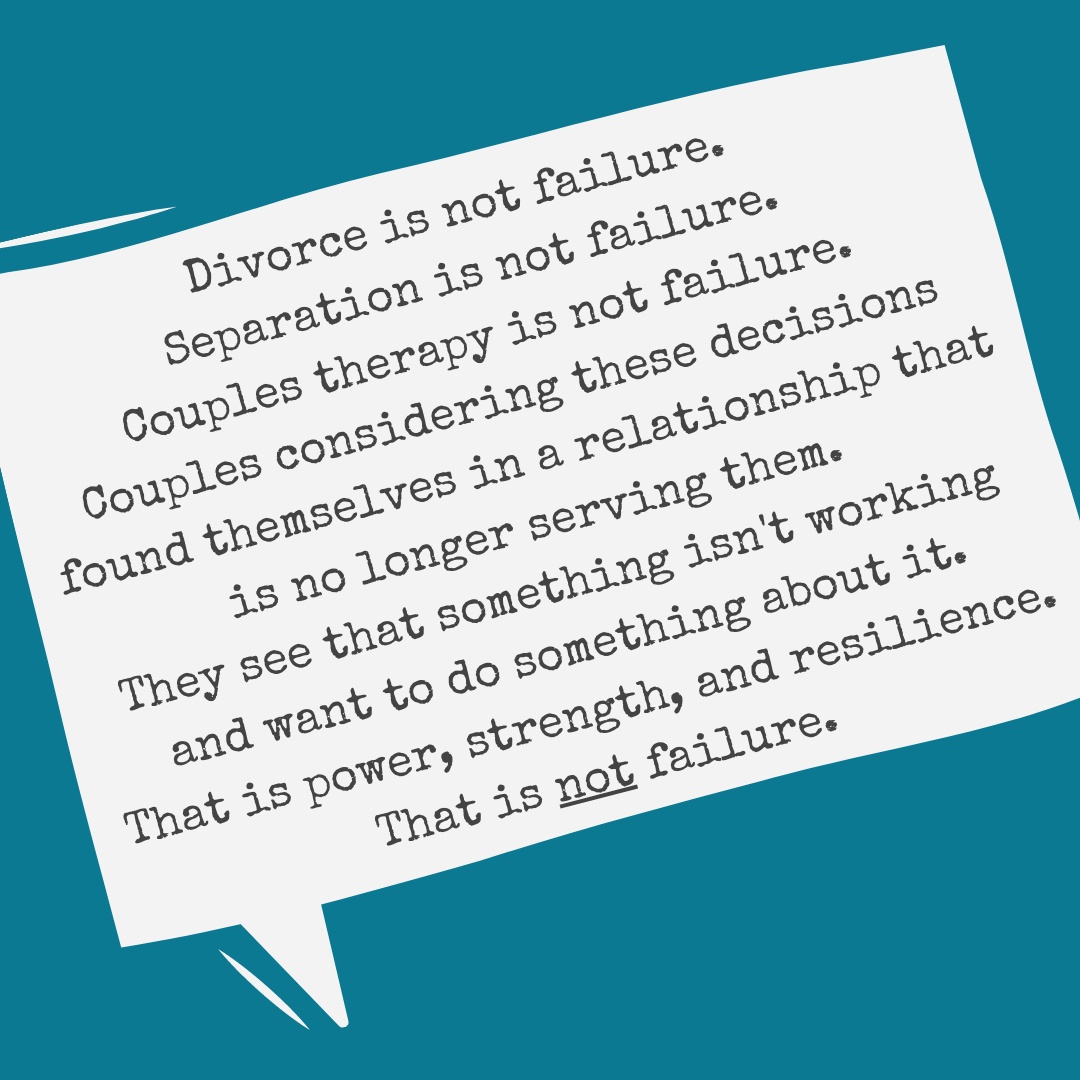Couples Therapy Myths (Part 2/3): Couples Therapy is for Failed Relationships

This week we focus on the Myth that couples therapy is for “failed” relationships. The ones with serious problems that couples on the brink of divorce find themselves in.
Before we go any further, I’d like to point out that those who are separating or considering divorce are not in failed relationships. These couples found themselves in a relationship that is no longer serving them. They had the courage to accept that difficult truth and then decided to do something about it. That required power, strength, and resilience. That is not failure.
While couples considering divorce can benefit from couples therapy for various reasons (we’ll get to that later), that is by no means all that couples therapy can help with. There is so much more and this misconception can prevent many couples from getting the help that they need.
 The truth is that the earlier you and your partner make it in to see a couple’s therapist, the less time you’ll have to spend in couple’s therapy! In a way, couples therapy is preventative.
The truth is that the earlier you and your partner make it in to see a couple’s therapist, the less time you’ll have to spend in couple’s therapy! In a way, couples therapy is preventative.
Let’s use a house as an analogy – as you live in a house, things regularly pop up that need your attention. A leaky faucet needs tightening, the garden needs tending, and lightbulbs need changing. Alone these tasks aren’t overwhelming and might only take a few minutes, hours or days to sort out. If you don’t know how to do them, you might avoid trying. If you learn to do it once, you’ll be capable of solving the problem whenever it comes up again.
Now imagine you let those tasks go without tending to them for several years. You say, “it’s not a big deal, I can deal with it, it doesn’t bother me that much” and you look the other way. Not only does that task stay incomplete, but others also pile on top of it – sometimes other things start to break down because the first ones goes untended to. Eventually, what started as a little discomfort becomes unbearable.
At this point you realize that something has to change but now change feels overwhelming and unmanageable – where would you even start? You might even think that maybe you should just sell your home and start over.
If home and garden television has taught us anything it’s that even the most neglected and unmaintained homes can get fixed up with time and attention. With that said, we would be lying if we didn’t agree that it’s a lot easier, less time consuming, and inexpensive to maintain your home bit by bit as things come up.
Couple’s therapy is relationship maintenance.
Just as maintenance can be useful at any stage of home ownership, couples therapy can be useful at any time in a relationship.
Don’t take my word for it, let’s debunk this relationship-harming myth by exploring some of the different phases of a relationship when couples therapy may be useful.
 Dating
Dating
Surprise!! Bet you didn’t expect to see this one.
You don’t need to be married or even living together to try couple’s therapy. Often, things first start coming up in the dating phase – there might be issues with trust, differences in expectations, or communication challenges that become apparent.
If the relationship is an important one that you’d like to maintain in the long-term, meeting with a couple’s therapist can prevent the problem from becoming a perpetual stuck point in your relationship.
 Pre-marital counselling
Pre-marital counselling
Whether it’s marriage or moving in together, this next chapter can be both magical and incredibly stressful. For many couples, it’s a time of high conflict. Couples therapy before you start this new chapter, can help you and your partner better understand each other’s needs and values, discuss important, albeit uncomfortable topics, and learn strategies that you can use to strengthen your relationship and effectively navigate any of the difficulties that will inevitably arise as you make this transition. While it is couples therapy, pre-marital counselling has a preventative focus and because it can increase relationship satisfaction, it can protect against many challenges related to relationship dissatisfaction such as infidelity, separation, and divorce.
 Transition stages
Transition stages
Transitions involve change and change is stressful. Change can lead to differences in opinion and can leave us feeling vulnerable. No matter the transition, couple’s therapy can help you and your partner remain connected and strengthen your relationship as you become accustomed to your new identities and routines and help you develop effective strategies to manage the transitions.
Transitions include, but are not limited to, parenting, marriage and divorce, co-parenting, relocation, and career advancement.
 Later in your relationship
Later in your relationship
Even those who made it this far can use a little help!
Reviving sex and intimacy, managing perpetual conflict, or overcoming resentments. Couples therapy can be helpful in many ways.
 Separation/Divorce
Separation/Divorce
This is a time filled with many emotions and difficult thoughts. Couple’s therapy can help you and your partner explore these thoughts and come to a decision. For couples who decide to split, couples therapy can be a space to explore and manage resentments and conflict to make the formalities less tumultuous. A couple’s therapist can help manage disagreements and differing values around co-parenting and help you both navigate your new relationship.
So there you have it, another couples therapy myth debunked.
Couples therapy applies to all phases of the relationship and the sooner you seek it, the less likely the problem will become unmanageable and the less time you’ll get to spend in therapy. Most importantly, the sooner you seek it the sooner you and your partner can reconnect and find joy in your strengthened relationship. Couples therapy has the potential to improve relationship satisfaction which research suggests can be a preventative to infidelity, separation, and divorce.
Check out our next blog where we debunk our final couples therapy myth – that couples therapy won’t work because only one member of the couple has the problem.

